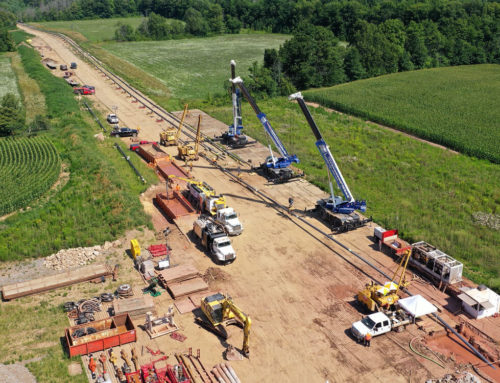Ask the Subject Matter Expert!
Ask the Subject Matter Expert!
Get to know Ron Buls, UPI’s Subject Matter Expert on Energy Industry Engineering.
Get to know Ron Buls, UPI’s Subject Matter Expert on Energy Industry Engineering.
Ron Buls
Subject Matter Expert on Engineering
Subject Matter Expert on Engineering
About Ron Buls
How long have you been at UPI?
13 years
Tell us about your field of work.
I’m an Engineering Generalist – the company often classifies me as a Subject Matter Expert, but the reality is I just have a lot of experience in a broad group of subjects.
What’s the one thing people should know about the energy industry?
The Energy Industry is a growing, continuously evolving business sector. It grows faster than the population of the world increases and requires new technology implementation to meet demand growth without causing unnecessary environmental impact. The impact of the energy industry generally goes without notice by most people except when it gets disrupted or when costs change suddenly.
What do you love about your field of work?
No two days are the same – there are new challenges to resolve each day and something new to learn each day.
Why is your job important?
The Energy Industry touches the life of every individual in the world, preferably in a beneficial manner to improve their quality of life.
What problems do you help clients solve?
I assist clients with resolution of technical problems/challenges ranging from project conceptual development through FEED, detailed engineering, equipment/materials selection, construction technical support, commissioning/start-up support and trouble-shooting of in-service facilities. It is much like the definition of engineer on my mouse pad (present from my daughter) “a person that solves problems you did not know you had using methods you do not understand”.
Do you have advice for anyone wanting to get into your field?
Be prepared to not have your greatest work accomplishments recognized by anyone other than some of your supervisors and some of your closest co-workers. The Energy Industry has both big name companies and never heard of companies but has mostly a relatively small number of never heard of engineers.
What do you do for fun?
I am frequently told that I must work for fun because I spend more time doing that than anything else. I do, however, have sideline activities including home remodeling, cabinetry, and for a while I worked with the Boy Scouts and my church. As I age, my quantity of sideline activity decreases – that’s the penalty of getting older (but the alternative to getting older is not all that exciting).
What do you like least about your work?
The worst part of my job is that I have to work with people! Conversely, the best part of my job is that I get to work with people! People are what makes our projects interesting especially since everyone has an opinion about how things should be done and there is no single correct way to do things in engineering. There is always room for discussion and opportunities to negotiate an acceptable solution for the specific requirements of each individual project.
How does your job affect your general lifestyle?
Engineering employment in the energy industry has provided me and my family with a fairly comfortable standard of living. Unfortunately, it has also provided me with a perspective of the world and world events that is different from most people in the world. My work has placed me in contact with people living in abject poverty where retrieving something to eat from a garbage pile makes for a good day and at other times with people that view eating leftovers from a five-star restaurant as beneath what they deserve. All those experiences affect my general lifestyle and the things I consider to be politically, socially and economically desirable. And yes, politics, religion, economics and environmental risks/hazards are unacceptable dinner discussions in our household.
What current issues and trends in the field should I know about/be aware of?
The biggest issue for the energy industry for the next decades until at least 2050 is ”global warming”. While a full technological knowledge of this phenomena is non-existent, it has garnered an important share of interest in the global political community and will gain importance so long as someone can present new data that they interpret to imply that our global environmental conditions are continuing to decline. The energy industry will be required to pursue new methodologies to reduce its contributions to this situation as it is being blamed for much of the perceived damage. The people employed in the energy industry will be required to identify technical and economical solutions to problems which may be more politically motivated than anything else. A lot of creativity will be required. The biggest thing – it will keep us gainfully employed if we are willing to work hard.
What kinds of accomplishments tend to be valued and rewarded in this field?
It is difficult to guess what accomplishments will be valued and rewarded in any field of endeavor. The energy industry is not a glamorous industry with advertising hype and public spectacles that everyone gets to watch. Engineering for the energy industry is about making it possible for much of the general public to have something above the basic essentials of life – some of the conveniences. Recognition and rewards for energy industry engineering may be restricted to a “well done” statement from your supervisor or co-workers rather than the “financial rewards” of a “salary bonus” when the “company” has a good year.
How did you become interested in this field?
Now, that is like an engineering question – there is no single answer!
Was it in my Junior Year in high school when I took the Preliminary Scholastic Test and was required to select a probable college course of study? There was an alphabetical list of “majors”, so I started at the top. I got as far as Chemical Engineering (the degree I was awarded after 5 years of college) and put the code for that on the form. I didn’t read any further.
Or was it just before my Senior year in high school when I was a participant in a 4-day seminar on power generation at UT-Austin and got to stand in a room with a nuclear reactor power generator.
Or maybe it was during my first summer engineering intern job when I was working in a power generating plant and we had a thunderstorm. A lightning strike caused a major control system failure and all of us in the plant (more than 40 people) had to go beyond our normal jobs to keep the plant operating. Amazingly, we didn’t walk away from the risks of working in the plant even after the design engineering firm told us that their process model when fed the failure conditions and operating conditions never managed to predict that the plant did not explode (6 simulation runs) and kill almost all of us. (Is it insane that I continued to work in this industry for more than 50 years after a computer says I died that day?)
Or maybe I became interested in this field because nearly half the engineering students graduating when I did had no job offers. I had exactly 1 offer before graduation day and it was in this industry.
What skills, abilities, and personal attributes are essential to success in your job/this field?
Engineering is largely a team effort. Most engineering activities do not require an extremely high tech capability. Engineering requires you to remember what you have been taught in school (basic technical knowledge) and what you have learned on the job into a personal knowledge base. Then you have to apply a little creativity (your own and your co-workers) to your knowledge base (and that of your co-workers) to identify a group of potential solutions to the problem at hand. Then comes the greatest challenge – you have to “work and play well with others” to come to an agreed solution to apply. I believe the most important attribute for success as an engineer is your ability to work with others.
How did you begin your career?
I began my “formal” career as a degreed engineer in the position of Junior Engineer at Texas Eastern Transmission Corp in the System Planning department. I did pipeline simulation calculations by hand, with a slide rule or with a Frieden electro-mechanical calculator through calculation forms. I did gas compressor and pump sizing, edit/wrote equipment specifications, inspected equipment in fabrication shops, did field start-ups and performance tests and did trouble-shooting of performance and vibration/pulsation problems on the Texas Eastern and Transwestern Pipeline systems. Did my first international engineering consulting work beginning 2 years after I started. I got to where I am now by “never saying no” when I was asked to do something – always interesting to see where that takes you.





